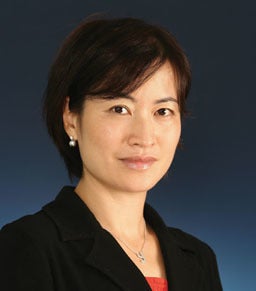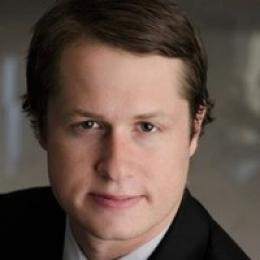
Yibing Mao
GENERAL COUNSEL AND SENIOR VICE PRESIDENT - ASSET MANAGEMENT & OWNER RELATIONS
MARRIOTT
It was a comfortable spring day on March 23, 2017, when Yibing Mao, Marriott’s chief legal counsel for Asia Pacific, walked into the retrochic China Club in Hong Kong. She was there to receive the “General Counsel of the Year” award, a prestigious honor of the Asia-Pacific Counsel Awards, for her work on the Marriott-Starwood merger. The US$14 billion merger created the world’s largest hotel chain, with 6,000 hotels, 1.2 million rooms, and more than 30 brands.
But it almost didn’t happen. The merger was initially announced on November 15, 2015, and garnered international media attention. For a year, discussions progressed. Marriott intended to move forward with integration plans when a third party showed up and outbid the company’s initial offer. The executive team had to make a quick decision on a deadline — walk away or improve the offer? Over the course of a month, the Marriott team sweetened the deal and the merger was back on track.
The synergies between Starwood, known for its brands, particularly its luxury brands and loyalty program, and Marriott’s operational excellence made it an excellent union for the companies’ shareholders. Starwood is especially strong in the Asia Pacific region, where it operates a large share of its hotels.
A unique arraignment
Mao’s legal team totals about 45 people, including 25 lawyers, with offices in Beijing, Shanghai, Hong Kong, Singapore, and New Delhi. The hospitality trade isn’t like other industries. It has its own accounting rules and principles. When Mao hires an in-house lawyer, it can take them up a long time to understand the industry. She is responsible for leading a legal team that supports the development of lodging operations, including asset management, human resources, IT, and BMSC — brand, marketing, sales, and consumer services.
“In this area we’re very lucky because the chairman of our company, Mr. Marriott, and CEO Arne Sorenson have set a clear tone from the top,” says Mao, emphasizing the idea that, “the way we do business is just as important as how we do it.”
China, in particular, has its own legal team because it’s nearly half of the region’s business. Operating in the Asia Pacific region has its own set of challenges. In general, the region is considered high-risk from a corruption standpoint. In addition to the Foreign Corrupt Practices Act (FCPA), the US law that governs overseas corruption, local laws are also becoming more prevalent. The legal team spends a lot of time navigating the new laws and determining how they will impact Marriott’s business. The legal team knows it helps the business. “In this area we’re very lucky because the chairman of our company, Mr. Marriott, and CEO Arne Sorenson have set a clear tone from the top,” says Mao, emphasizing the idea that, “the way we do business is just as important as how we do it.”
Mao’s team runs small trainings, usually about 15 to 20 general managers in each session, that address compliance issues. These sessions present real-world scenarios that have happened in the industry and managers work through potential responses. The scenarios usually involve third parties that are paid to expedite government business, a common practice in the region.
The hospitality industry in China is unique for another reason. Unlike in the United States, where about 75 percent of Marriott’s properties are franchised by large, institutional organizations, there are many first-time hotel owners in China. These first-time owners tend to be more involved in the day-to-day operations, Mao says. “Even some of the owners may have made their money in manufacturing and they decided to own a hotel or luxury property as a sort of trophy,” she explains.
Back to brand
Mao, who was born and raised in China, knows a lot about the cultural landscape. When she was growing up in the 1980s, she watched a lot of television, especially L.A. Law. “When you’re young, you’re idealistic and want to make a difference. I thought the best way to contribute to justice was to go to law school,” she reflects. She earned her law degree from Beijing University and then came to the United States to earn a law degree from Duke University. She initially practiced securities law and thought she would continue to pursue the corporate finance route. Mao often would help take companies public and thought project finance or investment banking was her future. While she was working for Milibank, Tweed, Hadley & McCloy in Hong Kong, a friend told her that Marriott was looking for a lawyer. She was familiar with Marriott’s reputation for business. “It was always branded as one of the best employers so I was very intrigued,” she remembers. Mao liked what she saw and she’s been with the company for more than 20 years.
Why stay at a company for so long? “It’s all about whether you like the people you work for and you work with,” Mao says. The other thing, she says, is that Marriott’s core values resonate with her personal values. She has never doubted the direction of the company. It’s something that customers of Starwood will be comforted by as a stronger hotel company emerges from the Marriott-Starwood merger.
Getting to know… Yibing Mao
WITH ALL THESE GREAT MARRIOTT PROPERTIES AROUND THE WORLD, WHERE WOULD YOU WANT TO GO ON VACATION?
I have stayed over the years at a lot of the Marriott hotels. Now that we bought Starwood, I’m really looking forward to staying in some of the Starwood hotels. For example, we just opened the St. Regis Maldives. The Maldives is a place I love. I think it’s a great place for you to chill, for anyone to chill. Marriott didn’t have as many hotels in Taiwan and in Japan, but Starwood’s brands have a lot more presence in both markets, and I love both markets, so I’m looking forward to planning a vacation in Taiwan and Japan.
WHAT ARE YOUR HOBBIES? WHAT DO YOU DO IN YOUR FREE TIME?
I do a lot of trekking and climbing. So I travel to different parts of the world to climb mountains. Two years ago, my husband and I went to a glacier trek in the Swiss and French Alps. It was a multi-day trek through the glaciers and we had to be roped up and had our ice picks and our crampons. We hiked, climbed, and went through many different terrains and stayed from hut to hut. That was very enjoyable.
And I also like high-altitude climbing as well, so my husband and I went to Nepal. We did the base camp trek. And we also went to Bhutan a couple of years ago. This year we went to a very remote island in New Zealand. It was a very muddy trail — also it was not very high but a very remote, very pristine area. We carried everything on our backs for multiple days. It was very interesting as well — very challenging but very enjoyable.




